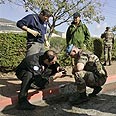
The secret’s out
Tuesday’s rocket attack on northern town exposes IDF’s relaxed attitude
The rockets fired at the northern town of Shlomi early Tuesday exposed a military secret: The IDF treats the Lebanon border as a peaceful and quiet one. Almost like the biblical end-of-days vision. As it turns out, the alert systems that are supposed to detect rockets launched at Israel and warn the civilian population are not activated regularly, because there are no warnings of impending attacks. We are dealing with a sleepy border. What a pleasure.
There is even an operational logic behind this. The alert systems installed on the northern border are highly sophisticated and are different from the systems deployed in the south, around the Gaza Strip. We are talking about sensitive systems, and ongoing activation would lead to erosion and malfunctions. We aspire to have these systems in top shape when the moment of truth arrives. Moreover, it might be unpleasant to admit this, but ongoing activation of these systems, 365 days a year, costs a lot of money.
So these systems are deployed regularly along the border, but they are turned off for part of the time. The moment the alert level changes, it is possible to activate them within a very short period of time.
There is only one small problem with this. The moment the army revealed that it does not activate these systems regularly, there is a possibility that various groups like the one that fired the rockets the other day would attempt to check the IDF’s alertness in one way or another, without taking a big risk in the process. At worst, they will run into a UN soldier. Hizbullah was also glad to hear that it has the occasional “window of opportunity” to fire an anonymous rocket at the Galilee.
Israeli officials estimate that the rocket attack Tuesday was carried out by the Usbat al-Ansar organization. We are talking about a small terror group that is closely affiliated with global Jihad and occasionally attempts to carry out terror attacks against Israel and against UNIFIL troops in southern Lebanon. The group attempts to undermine the status quo created in southern Lebanon in the wake of the Second Lebanon War.
The last time this group fired at Israel was June 17: A Katyusha rocket landed in the northern town of Kiryat Shmona. This time they fired a short-range 107 mm rocket from Wadi Hamul, located roughly 3-4 miles north of Shlomi. Their intention was to provoke the IDF to respond to the attack, which would create a mess: The Lebanese army would get involved, Hizbullah would join in, and the quiet will end.
The real danger
It is also possible to link this rocket attack to President Bush’s visit and to al-Qaeda’s call to sabotage the visit. Alternately, we can connect this attack to the instability in Lebanon, which allows groups such as the one mentioned above to infiltrate southern Lebanon and fire. As it turned out, Syria is not shying away either. The Syrian intelligence service has great affinity to various “resistance fronts”: Groups it forms that are made up of Lebanese and Palestinian so that it can closely monitor and control the disquiet and instability in Lebanon.
The Katyusha attack the other day has no long-term implications. On the other hand, another incident that occurred in Lebanon Tuesday should worry Israel no less, and possibly more: A bomb detonated near a UNIFIL convoy traveling from Beirut to Sidon and wounded three Spanish soldiers. This is the second time Spanish troops are hurt in southern Lebanon. Several months ago Spanish soldiers were killed in another incident.
All these incidents are meant to signal to the UN: Don’t work too hard; otherwise you will mix up with us, a serious element, Hizbullah.
The Spaniards make up one of the most serious regiments in the UNIFIL force, and possibly the most significant one. Should Hizbullah target these forces repeatedly either the UN will not be doing its job, or the various countries will have to pull their forces out of Lebanon. And then, Israel will be forced to activate its alert systems 24 hours a day, as this would mark the collapse of the agreement in southern Lebanon.










